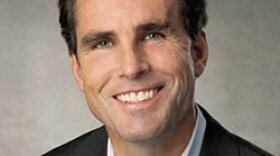As we near Veterans Day, groups in western Massachusetts recently gathered to hold a veterans expo in Pittsfield.About 50 people attended the event at Pittsfield’s Crowne Plaza hotel. Veterans’ services organizations and businesses set up information booths offering wellbeing and employment advice. During a panel discussion, three veterans shared their post-service experiences. Among them was Caleb Appleton who worked as a security guard at Berkshire Medical Center and entered classes at Berkshire Community College after being discharged from the Marines in 2005.
“I walked into a room where there was a bunch of kids joking around and I wasn’t,” Appleton said. “I didn’t want that. I was military-disciplined at that point. I wanted to throttle every one of them. It was a big change from being in the military where you’re told ‘Sit up straight. Listen. Answer when I tell you to answer.’ Then you get this roomful of kids that are all over the place.”
Appleton stuck it out and got his criminal justice degree, but a leg injury suffered while in the Marines hampered his law enforcement career. Unlike most stories you hear about veterans suffering from depression, Appleton didn’t see combat.
“It doesn’t mean that I didn’t still have my struggles,” he said. “I was disappointed in myself. I was disappointed that I didn’t get to do what I felt I wanted to do when I signed that contract. And I didn’t know where to go from there.”
Appleton says the sense of failure comes from being laid up with that stress fracture surrounded by fellow Marines in the same situation.
“When you hit that point where you’re not doing what I see everybody else training out there doing, it eats at you,” said Appleton.
Although he still struggles with depression, Appleton says he is in a much better place in the more professional atmosphere of nursing school.
“And we’re actually the loud ones in the class now, me and my friends,” Appleton said. “I hate to say that, but we just are.”
Army veteran Bryan Doe spent eight years as a forward observer attached to an infantry unit. Inspired to join after 9/11 at age 23, he deployed twice to Iraq, the first time for one year without home leave, the second 15 months. On February 8, 2008 the lead vehicle in his platoon was hit by an IED, killing four and breaking the backs of six others.
“Three days before that I was in that lead vehicle for the first two months of the deployment,” Doe said. “We just switched back because the weapons squad got their gun back so they could take lead vehicle control back.”
Doe says he faced survivor’s guilt when he got back home.
“I was going to booze,” Doe said. “I was just getting hammered all the time. And I never used to really drink. I had a handle of Jack Daniels’ and I was just getting ripped. And didn’t know why.”
Doe says he had to retrain himself to be a loving father and caring husband after having a warrior mindset in a combat zone for so long. With his marriage struggling and lacking motivation and happiness he sought mental health and substance assistance through the Army.
“What I realized that I missed more than anything was brotherhood,” he said. “Brotherhood, camaraderie and that feeling of being something and doing something for my country. That’s what I missed when I got back home. I didn’t feel like I had purpose anymore.”
Doe is now an outreach specialist with the VA working at its Springfield center. He is pursuing graduate coursework to become a counselor with the agency. Doe says community support and education can help veterans when they come back home. He says little things can trigger flashbacks for combat vets. For him, it’s gravel. The sound of it is the last thing he heard before collapsing from exhaustion after carrying his wounded brothers-in-arms back to base following that 2008 attack.
“When you see a veteran and he’s just blindly staring into space and you just think he’s being lazy at his desk, he could be going through a flashback and you have no idea,” Doe said. “But you look at him in a negative light. You’re judging him and saying ‘Hey you know what, this guy he’s lazy. He’s not doing what he’s supposed to be doing.’ Yet he could be walking down a road in Afghanistan about to get ambushed. That’s what’s going on in his head and you completely dismiss that because you’re not thinking that way. We have to start thinking that way.”








